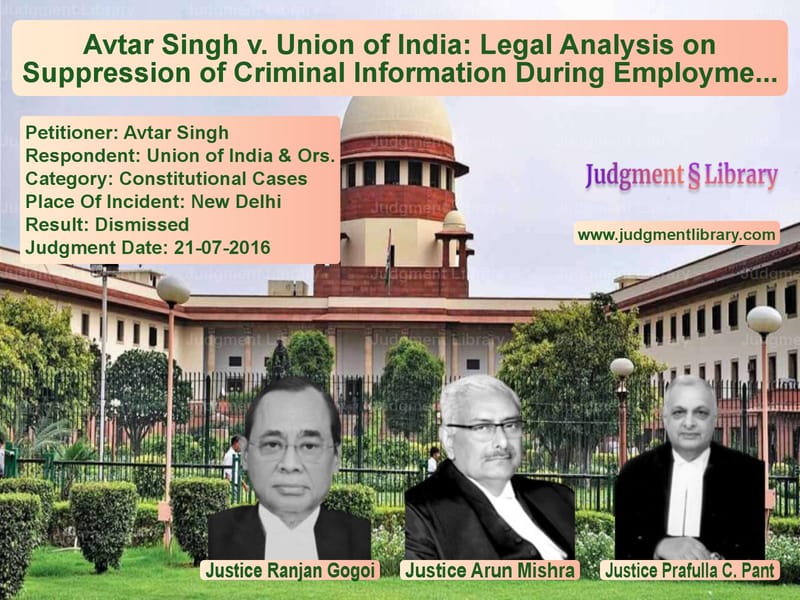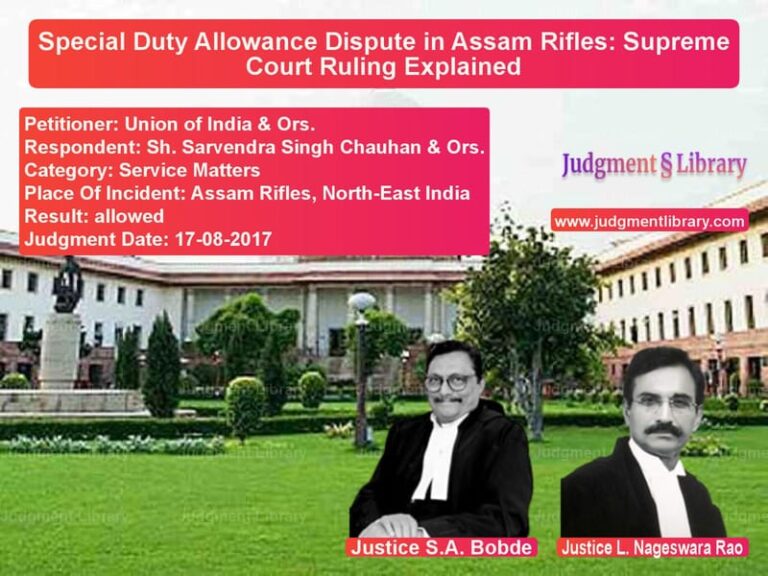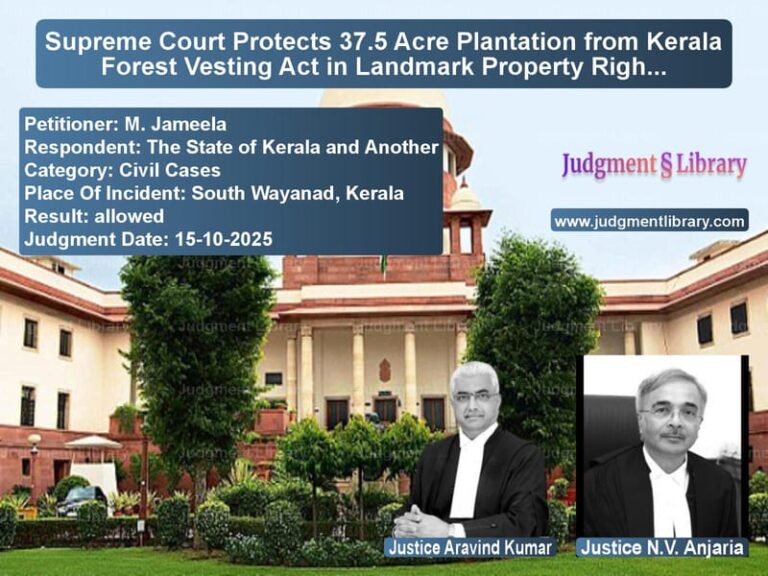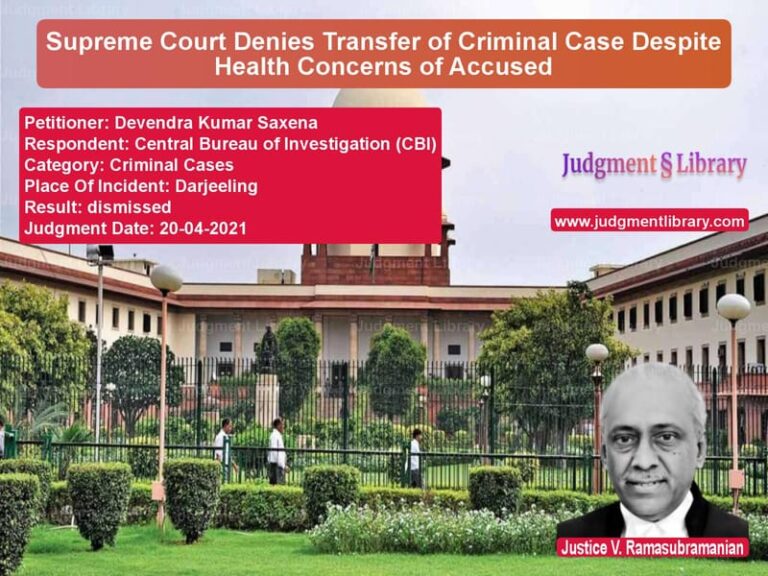Avtar Singh v. Union of India: Legal Analysis on Suppression of Criminal Information During Employment Recruitment
This case revolves around the issue of suppression of criminal information during the recruitment process for uniformed services, specifically in relation to the employment of constables. The petitioner, Avtar Singh, challenged the cancellation of his appointment by the Union of India, arguing that his non-disclosure of a pending criminal case during his recruitment process should not invalidate his appointment. The case brings to the forefront the legal consequences of suppressing material information during the verification process and the discretion of employers to cancel appointments based on such suppression.
Introduction:
The petitioner, Avtar Singh, was selected for the post of constable but was later informed that his appointment would be canceled due to the suppression of a criminal case that was pending against him at the time of his recruitment. He contended that the suppression was not material enough to disqualify him from service and that his subsequent acquittal further justified his claim for reinstatement. The primary issue before the Supreme Court was whether the suppression of criminal antecedents in the verification form could be grounds for terminating employment, even in the case of an acquittal. The case also raised the question of whether the verification process and the employer’s discretion in such matters adhered to the principles of natural justice.
Petitioner’s Arguments:
The petitioner argued that the suppression of information regarding his criminal case was not deliberate and did not involve any moral turpitude. He emphasized that the criminal case against him was pending at the time of his recruitment, but he had been acquitted of all charges. The petitioner further contended that the non-disclosure of the case in the verification form should not automatically disqualify him, particularly since he was not convicted, and there was no material suppression of fact. He also claimed that the decision to cancel his appointment was harsh and did not consider the fact that the suppression was not related to any serious offence. The petitioner argued that he should not be penalized for a youthful indiscretion that had no bearing on his suitability for the post of constable.
Respondent’s Arguments:
The Union of India, represented by the respondents, argued that the suppression of material information regarding the pendency of a criminal case was a serious offence in itself. The respondents contended that the purpose of the verification process was to assess the suitability of candidates for sensitive posts like constables, where integrity and honesty are paramount. The respondents emphasized that the suppression of such information reflected poorly on the candidate’s character and undermined the trust placed in him by the recruitment process. They asserted that the cancellation of the petitioner’s appointment was justified, as it was based on the principle that any deliberate omission or false information could render the individual unsuitable for employment, especially in a disciplined force like the police.
The Court’s Analysis:
The Supreme Court, in its judgment, acknowledged the importance of verification of character and antecedents in the recruitment process, particularly for posts in uniformed services where high standards of integrity are expected. The Court referred to several previous decisions, including the case of Sushil Kumar v. Delhi Administration, where the Court had ruled that suppression of material facts, even in the absence of a conviction, could render a candidate unsuitable for service. The Court emphasized that the suppression of facts related to criminal cases, even if the candidate was eventually acquitted, could still have a significant impact on the suitability of the individual for public service, especially in law enforcement.
The Court noted that the purpose of the verification process was to ensure that candidates appointed to positions of trust and responsibility were of good character. In this case, the suppression of the pending criminal case was found to be a material omission that reflected poorly on the petitioner’s integrity. The Court observed that the recruitment process required full disclosure of any criminal proceedings, regardless of whether the individual was ultimately acquitted or not. The Court also emphasized that the verification process was not just about the outcome of the case but about the candidate’s transparency and honesty in providing all necessary information.
The Court further distinguished between different types of criminal cases, noting that while minor offences may not necessarily disqualify a candidate, the nature of the offence, the circumstances surrounding the case, and the candidate’s response to the verification process were all important factors to consider. In this case, the petitioner had not provided complete and accurate information about his criminal case, which was seen as a violation of the trust placed in him by the recruitment authority.
Conclusion:
The Supreme Court ruled in favor of the respondents, upholding the decision to cancel the petitioner’s appointment. The Court affirmed the principle that suppression of material information, particularly regarding criminal antecedents, was grounds for disqualification, even in cases where the individual had been acquitted. The Court emphasized the importance of maintaining the integrity of the recruitment process and the discretion of the employer in determining the suitability of candidates for sensitive positions. The Court also clarified that the suppression of facts could not be excused simply because the individual had been acquitted or because the offence was minor. The appeal was dismissed with no order as to costs.
Don’t miss out on the full details! Download the complete judgment in PDF format below and gain valuable insights instantly!
Download Judgment: Avtar Singh vs Union of India & Ors Supreme Court of India Judgment Dated 21-07-2016-1741873364108.pdf
Direct Downlaod Judgment: Direct downlaod this Judgment
See all petitions in Fundamental Rights
See all petitions in Constitution Interpretation
See all petitions in Separation of Powers
See all petitions in Judgment by Ranjan Gogoi
See all petitions in Judgment by Arun Mishra
See all petitions in Judgment by Prafulla C. Pant
See all petitions in dismissed
See all petitions in supreme court of India judgments July 2016
See all petitions in 2016 judgments
See all posts in Constitutional Cases Category
See all allowed petitions in Constitutional Cases Category
See all Dismissed petitions in Constitutional Cases Category
See all partially allowed petitions in Constitutional Cases Category







